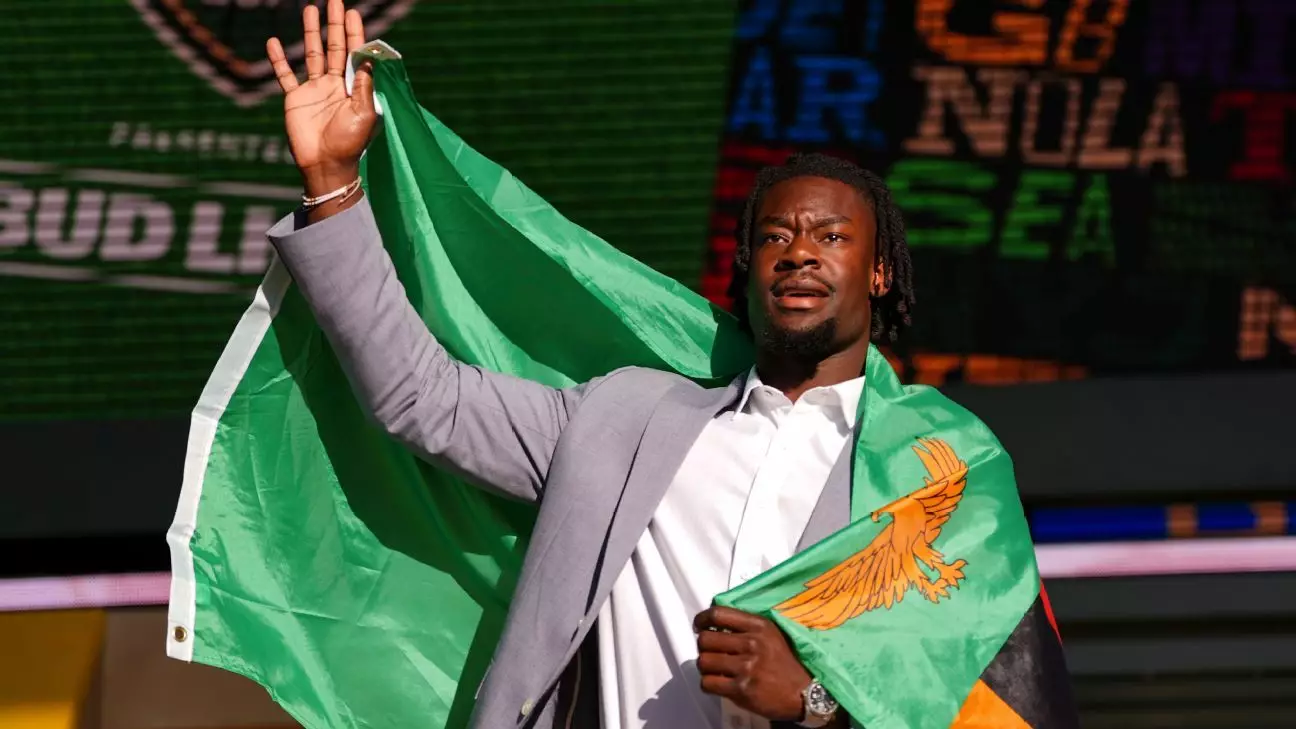Mapalo ‚Maz‘ Mwansa’s story is one of resilience and unexpected turns, reflecting how swiftly fate can alter one’s path. Influenced profoundly by Manchester City icon Yaya Touré, the young athlete, who grew up in Peterborough, England, initially envisioned his future on the soccer pitch. However, just as he was beginning to lose faith in his athletic ambition, an incidental comment from a friend reignited that flame. This moment signifies more than just a shift in Mwansa’s sporting direction—it encapsulates the raw power of encouragement and the impact of keen observation.
Trained in economics and finance at university, Mwansa’s life was steering him away from sport, as he had resigned himself to a future devoid of competitive athletics. In his mind, the dream of emulating his soccer hero was tucked away, rendered impossible by time. But little did he know that a simple remark from Henry Rowland, an up-and-coming player in the European League of Football, would change everything.
Discovering a New Passion
The transition from soccer fan to American football player was anything but conventional. With a solid physique and impressive sprinting speed, Mwansa was discovered during an informal sports day at university, where Rowland recognized his potential. It’s intriguing to consider how many talented athletes may remain hidden without the insight and support of peers who see their potential.
As Mwansa recounts, „I didn’t play any sport competitively,“ believing that opportunities had passed him by. It’s poignant to reflect on how many individuals, perhaps feeling overlooked, abandon their dreams. Yet, in Mwansa’s case, encouragement breathed new life into what he assumed was a lost cause. His subsequent leap into American football, fueled by inspiration from documentaries like *Last Chance U*, highlights the power of media in raising awareness and igniting passion for lesser-known sports.
Rapid Growth in a New Arena
What is particularly captivating about Mwansa’s foray into American football is the speed at which he advanced from being a novice player to effectively embracing the complexities of an intricately tactical sport. Initially stationed as a defensive end, he transitioned to an EDGE rusher—a role demanding not only physical attributes but also strategic acumen. His willingness to adapt showcases a mindset that goes beyond mere athleticism; it’s a growth mentality poised to challenge limitations.
He remarks on the tactical nature of American football, noting, „A lot of knowledge is needed to play the sport.“ This understanding could apply almost universally; mastery in any field requires not just skill but comprehension of strategies that govern actions. For Mwansa, utilizing his speed and strength becomes an exercise not just in physicality but intelligence—a reminder that sports merit an analytical approach just as much as any classroom setting.
Carrying a Legacy
Mwansa’s journey does not just reflect personal evolution; it symbolizes a broader narrative—a desire to change perceptions about Zambian athletes on global platforms. His pride in representing his heritage stems from a yearning to shift the lens through which the world views Zambia. Instead of being met with surprise at success, he ambitions to normalize it.
He illustrates this sentiment with an example from the Olympics, reflecting on the windfall of positivity surrounding Zambian sprinter Muzala Samukonga’s bronze medal. Transforming astonishment into standard expectation for Zambian athletes is an admirable goal, as Mwansa seeks to pave the way for future generations. The importance of role models, particularly from their home regions, cannot be overstated; they serve as tangible proof that perseverance can lead to greatness.
Lessons Beyond the Field
In Mwansa’s quest not only to excel as a player but also to shape his country’s athletic identity, several key lessons emerge. The first lies in the importance of seizing opportunities, even when they seem unlikely. Mwansa’s story exhibits that the right encouragement at the right moment can propel an individual into uncharted territories. Second, it underscores the transformative power of sport—and how it can act as a conduit for cultural representation and pride.
As Mwansa observes the existing disparity between the visibility of African athletes compared to their counterparts from other regions, one can sense his determination to change that narrative. His ambition resonates well beyond personal aspirations, serving as a clarion call for communities to foster and celebrate athletic talent, irrespective of conventional expectations.
Mwansa’s multifaceted journey illustrates a profound truth: success is not always born from a carefully mapped plan but often arises from taking bold steps into the unfamiliar. He is setting a precedent for what it means to embrace a destiny chosen with passion, persistence, and a deep-rooted desire to inspire.


Napsat komentář